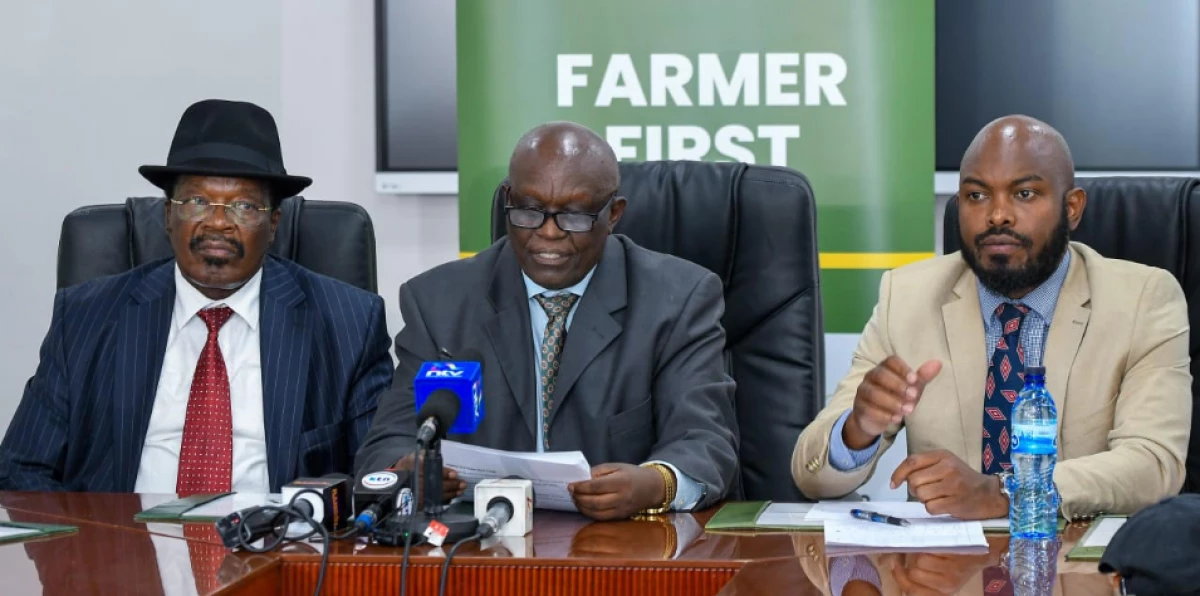KTDA dismisses claims of funds diversion from West to East Rift Valley

KTDA board members including James Ombasa (left) chairman Chege Kirundi { centre) and board member GG Kagombe during a past Press conference.

Audio By Vocalize
The Kenya Tea Development Agency (KTDA) has refuted claims made by a section of leaders from Kericho and Bomet counties alleging that over one billion shillings contributed by farmers from the West of the Rift Valley was diverted to the East of the Rift Valley.
In a statement
issued by the agency, the tea giant termed the claims as false and misleading,
saying they ignore the transparent and verifiable financial framework guiding
the implementation of Settet Power Generation Company’s small hydro projects.
The power
generation company, incorporated in October 2010, is jointly owned by seven tea
factory companies in Kericho and Bomet counties — namely Kapkatet, Litein,
Tegat, Momul, Kapkoros, Mogogosiek, and Kapset — together with KTDA Power
Company Limited. Each of the eight shareholders holds an equal 12.5% stake.
Settet Power
Generation Company was established to develop small hydro power plants to
supply reliable and affordable electricity to the factories, thereby reducing
production costs and improving farmers’ earnings.
Currently,
two hydro projects are under implementation — the Chemosit Small Hydro Plant,
with a capacity of 2.5 megawatts, and the Kipsonoi Small Hydro Plant, with a
capacity of 2.6 megawatts — located in Bomet and Kericho counties.
These
projects are financed on a 65:35 debt-to-equity ratio, requiring a total equity
contribution of Ksh 1.1 billion from shareholders. As of October 2025,
shareholders have contributed Ksh 1.03 billion against a total project
expenditure of Ksh 1.208 billion, all of which has been fully utilized within
the two projects in line with the approved budgets.
KTDA has
reassured farmers in Kericho, Bomet, and the entire West of the Rift Valley
that their contributions are safe, properly utilized, and directed solely
toward the intended projects aimed at lowering electricity costs and enhancing
farmer incomes.
According to
the agency, all project expenditures are subject to external audits and are
regularly reported to the respective Regional Power Company Boards, Factory
Boards, and shareholders during Annual General Meetings.
The statement
further noted that the challenges experienced in completing the projects mainly
arose from financing, administrative, and logistical issues — all of which have
since been resolved. The contractor has been fully re-mobilized, and the Chemosit
project is expected to be completed by May 2026.
The Kipsonoi
project is also progressing, with land compensation and topographical survey
works underway as financing discussions advance with prospective lenders.
KTDA
reaffirmed its commitment to transparency, accountability, and prudent
financial management, emphasizing that the Settet Power projects are
farmer-owned investments designed to achieve long-term energy self-sufficiency
and operational efficiency for factories in the West of the Rift Valley.
The agency has therefore urged all leaders to seek accurate information and verify facts before making public statements that may cause panic and confusion among farmers.


Leave a Comment